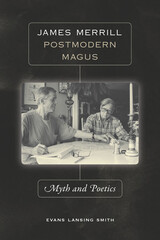
James Merrill is now widely recognized as one of the essential poets of our time, one of those whose achievement will define postwar American literature. The Consuming Myth is a discerning account of his work that will well serve amateur and initiate alike. Stephen Yenser ranges over all of Merrill’s writing to date, from a precocious book printed when its author was fifteen to his most recent publication, a verse play. He writes about both of the poet’s novels and pays particular attention to the epic poem The Changing Light at Sandover. His close readings shed light on Merrill’s boldly and subtly original techniques, his kinship with Mallarmé, Proust, Yeats, Stevens, and others, and the network of connections among his diverse undertakings.
Yenser suggests that Merrill’s special power springs in part from transactions between evidently opposing perceptions. On the one hand—as the result of some poetic version of what physicists call “pair production”—whatever Merrill looks at hard yields its contraries. All about him, and within him too, he discovers duality and division. On the other hand, he is profoundly aware of the interconnectedness of things, whether they be his life and his art (which we might think of as aspects of his work), or humanity and nature, or good and evil. It is out of quarrels with ourselves that we make poetry, Yeats observed; and it is in striving to accommodate intuitions of both difference and identity that Merrill has fashioned his distinctive manner.

In this meticulously researched, carefully argued work, Evans Lansing Smith argues that the nekyia, the circular Homeric narrative describing the descent into the underworld and reemergence in the same or similar place, confers shape and significance upon the entirety of James Merrill’s poetry. Smith illustrates how pervasive this myth is in Merrill’s work – not just in The Changing Light at Sandover, where it naturally serves as the central premise of the entire trilogy, but in all of the poet’s books, before and after that central text.
By focusing on the details of versification and prosody, Smith demonstrates the ingenious fusion of form and content that distinguishes Merrill as a poet. Moving beyond purely literary interpretations of the poetry, Smith illuminates the numerous allusions to music, art, theology, philosophy, religion, and mythology found throughout Merrill’s work.
READERS
Browse our collection.
PUBLISHERS
See BiblioVault's publisher services.
STUDENT SERVICES
Files for college accessibility offices.
UChicago Accessibility Resources
home | accessibility | search | about | contact us
BiblioVault ® 2001 - 2024
The University of Chicago Press









